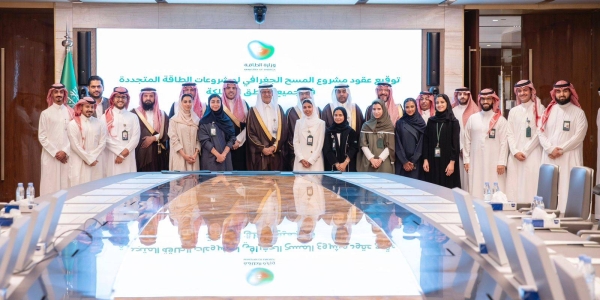Saudi Minister of Energy, Prince Abdulaziz bin Salman, has announced the launch of the Geographic Survey Project for Renewable Energy Sites in Saudi Arabia. This project, which is part of the National Renewable Energy Program, will see the installation of 1,200 stations to measure solar and wind energy across all regions of the Kingdom. The Minister stated that this project is globally unprecedented in terms of its geographical coverage, encompassing over 850,000 square kilometers, equivalent to the land area of entire countries such as the United Kingdom and France combined. He emphasized that no other country has conducted a geographic survey of this scale before.
The main objective of the Geographic Survey Project is to identify the best sites for developing renewable energy projects in Saudi Arabia based on the size of renewable energy resources and the priority of project development. The data collected by the stations will help in determining suitable sites for renewable energy projects and provide accurate information for their implementation. The solar energy measurement stations will record various parameters such as Direct Normal Irradiance, Global Horizontal Irradiance, and ambient temperature, while wind energy measurement stations will monitor wind speed and direction, among other factors.
The project also includes the establishment of a platform at the Ministry of Energy to monitor, record, and transmit measurement data around the clock. This data will be analyzed and processed digitally using artificial intelligence technologies to assess and rank sites based on their suitability for renewable energy projects. The accuracy and continuous updating of the data make it financeable according to local and international financial institutions, reducing risks related to project implementation and increasing investment attractiveness.
Prince Abdulaziz highlighted that the Geographic Survey Project reaffirms Saudi Arabia’s commitment to achieving its ambitious targets for producing and exporting renewable energy. The Kingdom aims to optimize the utilization of renewable energy resources, support strategic positions for exporting electricity generated from renewable sources, and produce clean hydrogen. The project will contribute to achieving optimal energy mix targets by increasing renewable energy sources to comprise about 50 percent of the energy mix by 2030, as well as reducing reliance on liquid fuel in electricity generation.
The Minister expressed his gratitude to Custodian of the Two Holy Mosques King Salman and Crown Prince Mohammed bin Salman for their continuous support in enhancing the Ministry of Energy’s capabilities. The Kingdom plans to tender new renewable energy projects with a capacity of 20 gigawatts annually starting from 2024, aiming to reach between 100 and 130 gigawatts by 2030. This initiative aligns with Saudi Arabia’s Vision 2030 goals and demonstrates its commitment to sustainable energy development and environmental conservation.
Overall, the Geographic Survey Project for Renewable Energy Sites in Saudi Arabia represents a significant step towards achieving the Kingdom’s renewable energy targets and reducing dependence on traditional fossil fuels. By utilizing advanced measurement technologies and data analysis techniques, Saudi Arabia aims to identify and develop optimal sites for renewable energy projects, supporting its transition towards a more sustainable and environmentally friendly energy sector.











